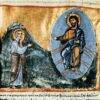Tag: Than
Devotional: More Questions than Answers
By Courtney Hall, Lutheran Office of Public Policy – California [ABOUT THE AUTHOR] In all honesty, I feel I have lost sense of what the phrase “common good” even means today. In a world so divided, what I view as the common good may be the antithesis of my neighbor’s beliefs; so, who decides? Is it those with power, is it a popular vote, is it those with the most influence? As I try to understand how my role as a faith-based advocate contributes to the common good, I am left with more questions than answers. It is in times…
Job’s Dramatic Irony: Getting God Right Through Suffering Rather than Nature
The biblical book of Job, literarily, operates with what is called dramatic irony. Here is how the Oxford Dictionary defines dramatic irony: a literary technique, originally used in Greek tragedy, by which the full significance of a character’s words or actions are clear to the audience or reader although unknown to the character.[1] As a reader, or even movie-watcher, we the audience have the capacity to read or watch with this type of ‘irony.’ We can skip to the end, and then read the beginning to the end, knowing what the final outcome is. Or we can read through a…
Reading the Prodigal Son Story as an Illustration of a Familial Rather than Legal Relationship
Here at Athanasian Reformed we often talk about soteriology; indeed, as a nexus interlinked with a whole host of other theological loci, within a theological taxis (order). I was once again reminded by someone on X/Twitter that not everyone thinks these matters through the inner-theological reality present within the warp and woof of Holy Scripture; they simply skim the outer-textual-top and think they have somehow penetrated the marrow therein. But as is the case, the biblical marrow is only gotten at when the reader understands the Bible’s res (reality): i.e., Jesus Christ. When Scripture is “exegeted” through a Ramist place…
A Devotion: Christ, ‘Closer to us than we are to ourselves’
5 One person regards one day above another, another regards every day alike. Each person must be fully convinced in his own mind. 6 He who observes the day, observes it for the Lord, and he who eats, does so for the Lord, for he gives thanks to God; and he who eats not, for the Lord he does not eat, and gives thanks to God. 7 For not one of us lives for himself, and not one dies for himself; 8 for if we live, we live for the Lord, or if we die, we die for the Lord; therefore whether we live or die, we are the Lord’s. 9 For to this end Christ died…
The Givenness of Christian Theology is Lively Rather than Dead[ly]
I think it always remains important, especially for those who are more “intellectually” predisposed, to remember that an application of that can never be an end in itself; everything, until the eschaton, is instrumental. That is to say, Christian doctrine, because of the dynamism and organicism of its reality in Jesus Christ and the triune God, should never became a calcified given and received. It is, indeed, both, that is, ‘given and received,’ but only as an organic lively reality wherein the receivers take what they’ve been given, speak with the Lord about it, fellowship with the communion of the…
Sin as Primarily Relational Rather than Forensic
Often you will see me emphasizing the sin/grace matrix as a relational rather than a purely forensic reality. This bears out only if the One we have sinned against is in fact a personal rather than monadic law-like being. Sin is personal and relational because, first, God is a relation of triune persons. At root our relationship to Godself is indeed based upon the correspondence God has first (before the foundations of the world) established for us in His imago Dei (cf. Col. 1.15), in His free and gracious election to be with us in the vicarious humanity of Jesus…
We Are Not Instruments Anymore than Jesus Is
The thing about being a co-heir with Christ is that you are not looked upon as a mere instrument in God’s hand anymore than the Son is. That is, you aren’t simply some dispensable tool the Lord uses and tosses away. No, He has adopted us into His very life, by grace; such that when we suffer, He first suffered for us; when we are in turmoil, He first was in turmoil for us; when we die, He first died for us; when He first resurrected and ascended, we now too will resurrect and ascend to be with Him forevermore….
On Being a Dialogical Rather than a Static Christian Thinker
This post deals with some technical stuff that might not be interesting for all readers, but I find it quite instructive in better understanding why it is that Thomas Torrance rejects the determinism that shapes frameworks of thought like that found, theologically, within Arminianism and Calvinism. And it should also help to illustrate an alternative route to thinking about things in causally determinative ways; which implicates the ways that, in the West, in general, we have become most accustomed to think, even though someone like Einstein and his theory of relativity has demonstrated that reality, in fact does not work in…
The Good News that We Are Sinners: The Incarnation is Greater than Sin
Jesus is our life; He is God’s humanity all the way down. ‘He who knew no sin assumed sin for us that we might become the righteousness of God in Him.’ Our sin is ever before us, but it is only now before us in the glorified face of Jesus Christ. We can never deny that we were, and continue to be (in this in-between) sinners, insofar that the humanity of God bears witness of this reality to us all our live long days. But it is this grace of God that has shown up for us in these last…
Knowledge of God: Irruptive Rather Than Domestic
I think sometimes folks aren’t appreciating the rub between what Barth (Torrance et al.) are doing when they offer an alternative—to classical theism—theory knowledge of God. It orbits around a question; a question Keith Johnson articulates with great clarity: Romans I Barth began concentrated study on Paul’s Epistle to the Romans a few months after delivering ‘The Righteousness of God’. The experience was slow-going, at least by the standards of his later output. The extra time spent on the manuscript, however, meant that Barth’s understanding of the distinctions and categories that had been working subtly throughout ‘The Righteousness of God’ had time…




![The Givenness of Christian Theology is Lively Rather than Dead[ly]](https://protestantbeliefs.com/wp-content/uploads/2023/06/martinchemnitz-100x100.jpg)




